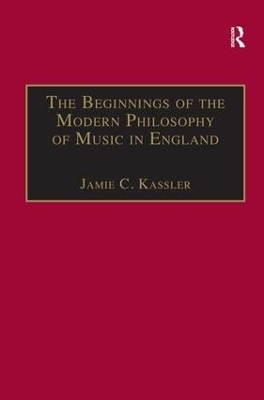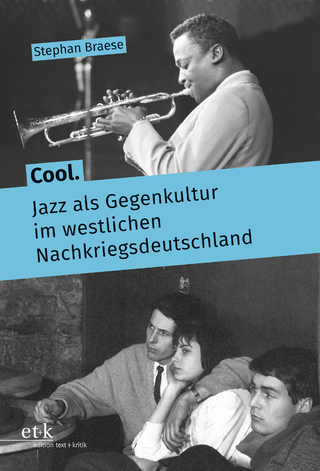
The Beginnings of the Modern Philosophy of Music in England
Francis North's A Philosophical Essay of Musick (1677) with comments of Isaac Newton, Roger North and in the Philosophical Transactions
Seiten
2004
Routledge (Verlag)
978-0-7546-0139-5 (ISBN)
Routledge (Verlag)
978-0-7546-0139-5 (ISBN)
Jamie Kassler makes clear in this text, some of the main principles that guided the modern philosophy of music from its very beginnings in the 17th century.
In 1677 a slim quarto volume was published anonymously as A Philosophical Essay of Musick. Written by Francis North (1637-85), chief justice of the Common Pleas, the Essay is in the form of a legal case argued from an hypothesis. Utilising the pendulum as his hypothesis, North provided a rationale from mechanics for the emerging new musical practice we now call 'tonality'. He also made auditory resonance the connecting link between acoustical events in the external world and the musical meanings the mind makes on the basis of sensory perception. Thus began the modern philosophy of music that culminated with the work of Hermann von Helmholtz. As a step towards understanding this tradition, Jamie C. Kassler examines the 1677 Essay in its historical context. After assessing three seventeenth-century criticisms of it and outlining how one critic developed some implications in the Essay, she summarises the basic principles that have guided the modern philosophy of music from its beginnings in the 1677 Essay. The book includes an annotated edition of the Essay as well as the comments of the three critics.
In 1677 a slim quarto volume was published anonymously as A Philosophical Essay of Musick. Written by Francis North (1637-85), chief justice of the Common Pleas, the Essay is in the form of a legal case argued from an hypothesis. Utilising the pendulum as his hypothesis, North provided a rationale from mechanics for the emerging new musical practice we now call 'tonality'. He also made auditory resonance the connecting link between acoustical events in the external world and the musical meanings the mind makes on the basis of sensory perception. Thus began the modern philosophy of music that culminated with the work of Hermann von Helmholtz. As a step towards understanding this tradition, Jamie C. Kassler examines the 1677 Essay in its historical context. After assessing three seventeenth-century criticisms of it and outlining how one critic developed some implications in the Essay, she summarises the basic principles that have guided the modern philosophy of music from its beginnings in the 1677 Essay. The book includes an annotated edition of the Essay as well as the comments of the three critics.
Jamie C. Kassler, Fellow, Australian Academy of the Humanities, Australia
Illustrations, Prefatory Note and Acknowledgments, Abbreviations, 1 Introduction to A Philosophical Essay o.f Musick (1677), 2 The System of the Essay, 3 The Critics of the Essay, Conclusion, Appendix A: Editions, Appendix B: Some 'Ingenious Acquaintances' of Francis North, References, Index of Names, Index of Subjects
| Erscheint lt. Verlag | 28.3.2004 |
|---|---|
| Verlagsort | London |
| Sprache | englisch |
| Maße | 156 x 234 mm |
| Gewicht | 544 g |
| Themenwelt | Kunst / Musik / Theater ► Musik ► Musiktheorie / Musiklehre |
| ISBN-10 | 0-7546-0139-0 / 0754601390 |
| ISBN-13 | 978-0-7546-0139-5 / 9780754601395 |
| Zustand | Neuware |
| Informationen gemäß Produktsicherheitsverordnung (GPSR) | |
| Haben Sie eine Frage zum Produkt? |
Mehr entdecken
aus dem Bereich
aus dem Bereich
Grundbegriffe, Harmonik, Formen, Instrumente
Buch | Softcover (2021)
Philipp Reclam (Verlag)
7,80 €
Jazz als Gegenkultur im westlichen Nachkriegsdeutschland
Buch | Hardcover (2024)
edition text + kritik (Verlag)
42,00 €


